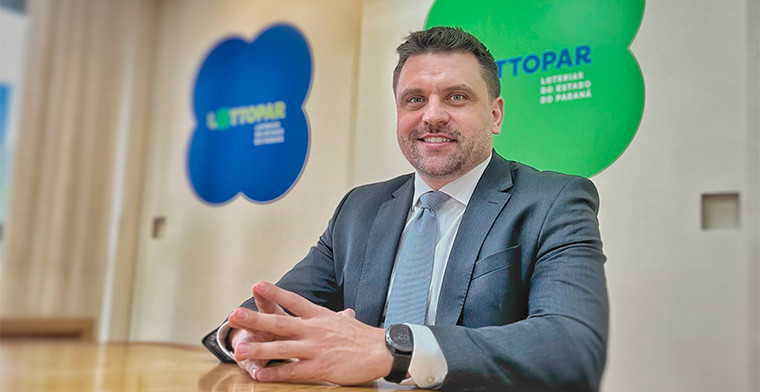Lottopar CEO Daniel Romanowski's Perspectives on Brazilian State Lotteries
Monday 27 de May 2024 / 12:00
2 minutos de lectura
(Brasilia).- In this article, Daniel Romanowski, CEO of Lottopar, defends the advantages of state lotteries over municipal lotteries, highlighting the positive impact on the economy and employment generation in Paraná, while ensuring compliance with current legislation to guarantee legal security and social return.

As the head of Loterias do Paraná (Lottopar), an autarchy linked to the State Secretariat for Administration and Social Security of the Government of Paraná, I am convinced that state lotteries will be more beneficial for municipalities and the Union, boosting the economy and generating jobs with a social return. But always with actions based on current legislation, as a way of providing legal certainty for the licensed operators who operate in Paraná. These concessionaires, who are authorised to operate in our state, are obliged to follow the Federal Laws, State Laws and State Decrees on the subject.
According to the laws in force and recalling an important decision by the Federal Supreme Court, published in December 2020, the states and the Federal District have the right to operate lottery activities in their territories. This means that the Federal Government does not have the exclusive right to institute lotteries and exploit their modalities. However, it is important to emphasise that this STF decision does not extend to municipalities. In other words, even with this decision, municipalities are not authorised to create their own lotteries.
As I said earlier, municipalities don't have the power to legislate on the subject and in my opinion there is no market size for municipal lotteries. Nor are the prize pools attractive enough to attract players to municipal lotteries. We also have another important aspect to consider, which is the fact that when municipalities set up their municipal lotteries, they are giving up the Tax on Services of Any Kind (ISSQN) and other more voluptuous social contributions in order to grab a much smaller tax. We must also consider that the amounts collected by the State Lottery go to the municipalities through actions and investments by the Government of Paraná in public safety, popular housing and social actions, in other words, with the state lottery, the municipalities benefit from the collection of taxes, social contributions and social return.
Another aspect of the state lottery's advantage over municipal lotteries is its capillarity, since the lottery games authorised, monitored and inspected by Lottopar reach all regions of the state and, as stated in the public notice, the concessionaire is obliged to set up dedicated physical points of sale in the state's ten mesoregions, as well as non-dedicated retail outlets such as newsagents, convenience stores and other locations authorised by Lottopar.
As a way of providing legal support for our position against some municipal movements to create their own lotteries, I would like to quote an excerpt from a statement by one of Brazil's leading lottery lawyers, Dr Roberto Brasil Fernandes, author of the book Lottery Law. Roberto Brasil Fernandes, author of the book Direito das Loterias (Lottery Law), in which he emphasises that "within the regulatory framework presented, the only alternative for municipalities is to seek collaboration with the state in which they are located, or with the Federal Government, in order to have part of the revenue passed on to their territory, in addition to charging the Tax on Services of Any Nature (ISSQN) on the lottery business. It can be concluded, therefore, that in addition to the fact that the grounds of the STF's decision do not honour the issue, it can be seen that the constitution itself does not honour the competence of municipalities to operate lotteries, since it does not give them residual competence, as is the case with the Member States and the Federal District."
In an interview with Lottopar's communications team, at the Cibelae Congress in Argentina in April this year, Dr Roberto Brasil Fernandes reinforced that "what the municipalities are doing is a legal adventure, and is not provided for either in the Constitution or in the STF decision. I was one of the lawyers who filed ADPF 493 with the Supreme Court and the court's understanding is very clear that only the states have the right to commercialise lottery modalities. There is nothing in any of the Supreme Court's rulings that addresses this claim by municipalities to create their own municipal lotteries, which is clearly a legal adventure by the mayors."
We therefore believe that from a legal point of view, according to Decree-Law No. 6.259 of 10 February 1944, in its article 4, "Only the Union and the States may operate or grant lottery services, the former and the latter being prohibited from more than one lottery operation or concession", the municipalities, by venturing into a matter that is not theirs, could create a legal battle. On the other hand, the state lottery is not a competitor of the municipalities; on the contrary, it is a safe and responsible source of entertainment, with a social return that benefits the residents socially. The funds raised by Lottopar will be invested in the municipalities through actions by the Government of Paraná, such as improving public safety, building affordable housing and social actions. The municipality itself benefits.
Nowaydays, Lottopar is able to offer a lottery market with legal certainty for the concessionaires who are investing in our state, security for the players, as well as putting the state of Paraná at the forefront in Brazil in many pioneering and innovative actions, which makes Lottopar one of the best state lotteries in Brazil.
We are constantly striving for a safe, responsible lottery market with the highest levels of compliance and governance, which is why we are the only lottery in Brazil to be associated with three of the largest sports betting lottery associations in the world. We were the first state lottery in Brazil to be associated with the World Lottery Association (WLA), the largest lottery association in the world; the first lottery to be associated with the Union of Lotteries for Integrity in Sports (ULIS), which promotes educational actions against the manipulation of sports results, and we are also associated with Cibelae, which is an Ibero-American corporation of state lotteries and betting, the largest in Latin America.
The Arguments for Failure to Comply with a Fundamental Precept (ADPFs) 492 and 493 were judged by the Federal Supreme Court (STF) and resulted in the recognition of the competence of the states and the Federal District to operate lottery activities in their territories. This means that, as established in the STF's decision, it is not the exclusive responsibility of the Federal Government to set up lotteries or operate lottery activities.
However, it is crucial to emphasise that this STF decision does not extend to municipalities. In other words, while states and the Federal District have the go-ahead to operate lotteries within their jurisdictions, municipalities do not have the same authorisation.
The reason for this distinction is related to the division of competences established by the Brazilian Federal Constitution. While states and the Federal District have the autonomy to legislate on certain issues, including lottery activities, municipalities are subject to a different range of competences, with less authority over certain areas, as is the case with lotteries.
So while the STF's decision has a significant impact in recognising the competence of the states and the Federal District in this context, it does not grant municipalities the ability to create and operate their own lotteries. This is an important distinction to consider when interpreting the scope of this decision.
Categoría:Legislation
Tags: Sin tags
País: Brazil
Región: South America
Event
iGaming Club Conference Cancun
24 de November 2025
Levon Nikoghosyan Confirms iGaming Cancun’s Success and Future LATAM Expansion
(Cancun, SoloAzar Exclusive).- The vibrant energy of iGaming Cancun has set the tone for a new chapter in the Latin American iGaming industry. Levon Nikoghosyan, CEO and Co-Founder of AffPapa and iGaming Club, shared his enthusiasm for the event’s debut in Mexico, highlighting its impact on the regional market and the company’s ambitious plans for the future.
Thursday 04 Dec 2025 / 12:00
iGaming Club Cancún 2025 Concludes Successfully with Strong Connections in Its First LatAm Edition
(Cancun, SoloAzar Exclusive).- iGaming Club Cancún 2025 came to a close last night with a comprehensive experience of conferences, networking, and the AffPapa iGaming Awards LATAM gala, consolidating itself as a unique space for operators, affiliates, and providers in the region.
Thursday 27 Nov 2025 / 12:00
iGaming Club Cancún 2025: Affiliates, Operators, and Innovation Take Center Stage on Final Day
(Cancun, SoloAzar Exclusive).- The second and final day of iGaming Club Cancún 2025 unfolds today, bringing together operators, affiliates, and select B2B providers in a unique networking and conference environment that highlights the evolving dynamics of the Latin American iGaming market.
Wednesday 26 Nov 2025 / 12:00
SUSCRIBIRSE
Para suscribirse a nuestro newsletter, complete sus datos
Reciba todo el contenido más reciente en su correo electrónico varias veces al mes.




















